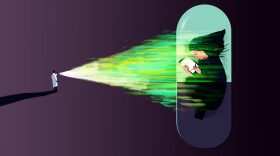-
Ever since he started working at Rainier School in Buckley, Washington, Willis McNabb has been hearing that the state was going to close it. This time, he said it feels more real.“I've never been so worried as I am today,” McNabb said. Since 1991, McNabb has worked at Rainier, which gives people with intellectual and developmental disabilities a place to find community, learn, work and receive comprehensive health treatment.
-
Many people forced into labor or the sex trade seek medical help at some point, and health care workers are being trained to identify them and to offer assistance.
-
As the nation grapples with a crisis of opioid addiction, a medical device called the Bridge is being touted as a way to help people through the symptoms of withdrawal. Does it work?
-
Women outnumber men in obstetrics and gynecology residencies and medical practices in the U.S. Heads of training programs now wonder if they should go out of their way to recruit more men.
-
Research scientists say they want to define Alzheimer's by the biological changes it causes in the brain, rather than by symptoms like memory loss.
-
A 51-year-old Washington man nearly died from septic shock, when a crushing injury led to overwhelming infection. After getting an experimental treatment, he's recovering well, but some doctors want more proof.
-
The report released by Missouri Democratic Sen. Claire McCaskill says the cozy relationship between pain advocacy groups and pharmaceutical companies may have played a key role in the opioid crisis.
-
Lew Zirkle, a doctor in Richland, Washington, works with thousands of surgeons all over the world to treat injuries in poor or war-ravaged countries. He will receive the U.S. Department of Defense Medal for Distinguished Public Service—the highest honor the Defense department gives to a non-career civilian—by Secretary James Mattis later this month.
-
In the U.S., access to good dental care is relatively easy to come by. Dentists are able to catch and treat problems quickly. But in developing countries…
Play Live Radio
Next Up:
0:00
0:00
Available On Air Stations









